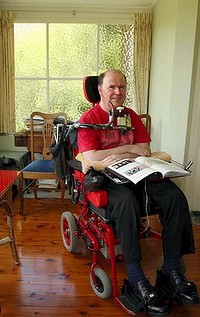Bridging disability and music for a busy life
Sydney Morning Herald
Posted on December 3, 2011

John Blades, 1959-2011
During his working life John Blades was an engineer who built bridges with the Roads and Traffic Authority, but the most productive elements of his life concerned the making of connections between people and disparate points of reference.
Blades, who has died a few weeks shy of his 52nd birthday, was diagnosed with multiple sclerosis in 1982 when he was 23 – the same year he commenced work in structural engineering.
From the late 1970s and through his university days, Blades developed a passion
for alternative music styles – cut-ups, electronics, plunderphonics, tape loops, industrial noise, experimental soundscapes – as well as a life-long devotion to music of the post-punk era.
Inspired by programs on the nascent Double Jay radio, he embraced the avant-garde and found musical equivalents to most of the visual art forms that interested him in a kaleidoscope of futurism, minimalism, music concrete, expressionism, Dada, surrealism, dub and reggae.
Not content to simply consume, he became involved – first with Double Jay’s Peter Doyle, Mac Cocker and Tony Barrell, later with the Biennale of Sydney and practitioners from the improvised music scene. He championed groups including Severed Heads and Scattered Order and keenly supported Ian Hartley, editor of Spurt magazine, the godfather of Sydney’s experimental music scene and proprietor of a clothing shop known as Skin Deep.
In 1981 he met broadcaster Richard Fielding at the Death Exhibition mounted by the Institute of Contemporary Events. Fielding would become his principal collaborator in The Loop Orchestra, a performance group that was to occupy Blades for the rest of his life.
He began reaching outside Australia too, forming new friendships with musicians from Cabaret Voltaire and Pere Ubu and assisting in multiple initiatives – both in recording and performance art pieces – and, subsequently, the Now Now Festival and exhibitions of Art Brut – or Outsider Art.
In 1981, after appearing on Hartley’s eclectic 2MBS-FM radio program, Disc Noir, he took stewardship of the program’s late-night timeslot, renaming it Hot Dog You Bet and co-founding the Contemporary Music Collective that still exists.
This program complemented Alessio Cavallaro’s seminal Contemporary Editions – later morphing into Background Noise which he hosted until a few weeks ago.
With Fielding and Anthony Maher, the first incarnation of the Loop Orchestra also emerged and its debut release soon followed as did others on the band’s own label, Endless Recordings.
Blades’ mother, Pam, had lived with multiple sclerosis and had not been unduly inconvenienced by the disease, so he remained optimistic even as it consumed first his mobility and eventually his motor function.
Two elements united to ensure his life remained productive and engaged. One was Blades’s formidable willpower. The other was the devoted care of his brother, Bruce. With Bruce’s tireless dedication he was able to live at home in Greenwich and cultivate his passions even as the disease robbed him of movement. When driving became impossible in 1997 he took to a wheelchair. When his arms ceased functioning, he bought an electric wheelchair with a chin control.
After 16 years in the workforce he was obliged to quit the Roads and Traffic Authority in March 1998. Engineers from Ability Technology eased him into the virtual age with a fully-integrated computer system, allowing him to type and control phone and internet connections with an infra-red beam manipulated by head movements. Dragon Naturally Speaking (Version 6) provided access to a text and email facility, sustaining his global connections.
Special-needs taxi drivers Emanuel and Ali ferried Blades to and from countless functions.
Despite requiring constant home care intervention and intermittent sojourns at Lidcombe’s Multiple Sclerosis Centre (”boot camp”), Blades remained alert, impassioned and involved with a wide circle of artists and creative people. He kept abreast of film, television, radio, the gallery scene, festivals and concerts. His themed Christmas parties were well attended by devoted friends, admirers and neighbours. He would sip beer through a straw and be fed by whoever was close to hand – more often than not, his orchestra confidante and co-conspirator, the tireless Emmanuel ”Manny” Gasparinatos.
Scarlet Road, a television documentary about sex and the disabled will be broadcast on SBS this Friday. Nominated for a Walkley, it featured John in a cheerfully forthright look at the unifying of two marginalised groups – disabled men and a sex worker providing therapeutic contact.
He was a prominent participant in the radio documentary The Too Hard Basket, which won a Walkley last year for Social Equity Journalism. It also received the human rights award and best documentary from the Asian Broadcasting Union. In every facet of his life, Blades was quietly, sincerely and humbly proactive, yet all his activities were informed with passion.
He lived life as it came – a day at a time – and maintained an impressive schedule until his final weeks.
His multiple sclerosis was ”under control” in recent years but complications from cancer therapy left him too weak for surgical intervention and he died peacefully in hospital on November 25.
He never took a backward step – nor, in his wheelchair days – a backward roll.
Doug Anderson
www.smh.com.au/national/obituaries/bridging-disability-and-music-for-a-busy-life